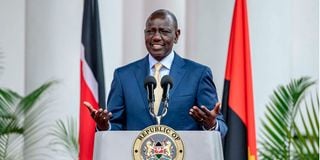President must see to the full implementation of devolution

President William Ruto.
The circus emerging between the national government and county governments on handling the effects of the ongoing El Nino rains brings to the fore the urgent need to fully devolve functions and resources as envisioned in the constitution.
On August 16, President William Ruto expressed his commitment to transferring all devolved functions and the attendant resources that are still being held by the national government, 10 years since the new constitution came into effect. He assured that the process would be concluded within 60 days. That promise is far from being fulfilled.
Further, President Ruto recognised that the delay in disbursement of constitutionally set equitable revenue share funds to the counties has had negative impacts on service delivery, leading to poor outcomes. Regrettably, in the quarterly economic and budgetary review report for the period ending September in the current financial year, transfers to the county governments were below target by Sh62.5 billion. This is another broken promise.
The group of governors and senators who have served in the last 10 years cannot escape responsibility for this unjustifiable failed transfer of the all devolved exclusive and concurrent functions and corresponding resources. They have been complacent and complicit. They have spent most of the time engaging in meaningless bickering and childish supremacy fights.
The current group of governors and senators are no better. They are steeped in politics and praising of the Presidency rather than firmly demanding the national government abide by the constiution.
Devolution is the core promise of the 2010 Constiution of Kenya. It is the engine for revolutionising and transforming governance and services, and creating inclusive development in the country. While the constitution requires the two levels of government to engage in cooperation, coordination and consultation, this is only possible after the national government has surrendered all devolved functions and resources.
The national government is legally required to provide technical support and capacity development to county governments to ensure they satisfactorily deliver on their constitutional mandate. Rather than fulfilling this legal demand, the national government has been hindering, obstructing and systematically clawing back devolution.
The transfer of all devolved functions including exclusive and concurrent and resources was supposed to have been completed in seven years and upon ensuring that all county governments can perform their mandates optimally. Yet there are still exclusive functions that are yet to be fully operationalised in the counties.
It is unacceptable that the national government’s ministries, departments and agencies are still heavily performing some county exclusive functions or certain aspects of them. This is most evident in the functions of health, housing, agriculture, roads, water, sanitation and education, among others.
The recent detailed report released by the Inter-Governmental Relations Technical Committee (IGRTC) confirms this fact. The report revealed that the national government is holding devolved functions and assets valued at more than Sh400 billion are yet to be transferred to county governments, with some ministries performing large elements of devolved functions. Elements of devolved functions still held by ministries include: agriculture (41), health (45), education (52), water (18), roads (51) and trade (37). Others ministries holding large elements of devolved functions are energy, tourism and environment .
Further, the precise mode of making concurrent functions operational has not been resolved in all sectors. The exact levels of responsibility and accountability of each level of government concerning most of the concurrent functions remain indeterminate.
Functions overlaps and duplications persist. The two levels of government do not adhere to their respective roles and levels of responsibility. Their planning and budgeting still captures functions that are legally outside their jurisdictions. The functions of state corporations and parastatals largely remain unbundled, a process which is a necessary precursor to transferring any component of their functions that should be performed by county governments.
It is evident that there is a need to expedite the establishment of new policies and review of existing ones, laws and institutional frameworks to ensure they facilitate improved governance and service delivery, which can only be attained if the respective levels of government adequately carry out their responsibilities as spelt out in the constitution.
There exists consensus on three key things—devolution has changed lives, services and power dynamics across the country; devolution has played a critical role in politically stabilising the country; and the underpinning social contract and cornerstones of the 2010 constitution are devolution, public finance, social and economic rights and public expenditure that promotes equitable development. Counties are the new frontiers of inclusive wealth and job creation.
President Ruto must walk the talk in implementing devolution. He must retrace and correct missteps that happened after the 2013 General Election, including failure to: implement fundamental structural reforms, and restructure and align political and economic governance, services and public sector functions The net effect of this has been to put the country on the disastrous economic and financial meltdown being witnessed. It is time for radical governance and economic changes.
This is a national dialogue on social and economic rights, quality public and social services, local economies and production, jobs and incomes, unleashing people’s potential and creativity, dignity and human freedoms. President Ruto must deliver this 2010 constitution vision.
- Mr Wainaina is a Transitional Justice and Human Security Fellow, @NdunguWainain




